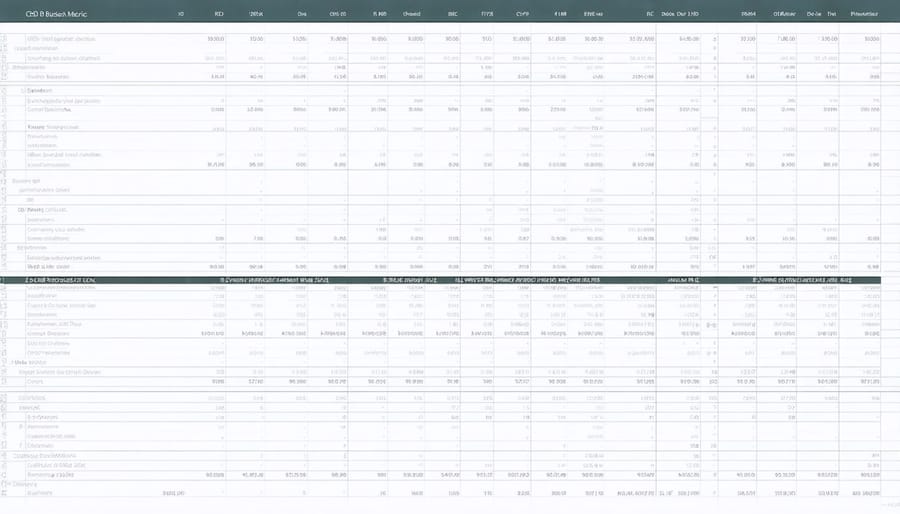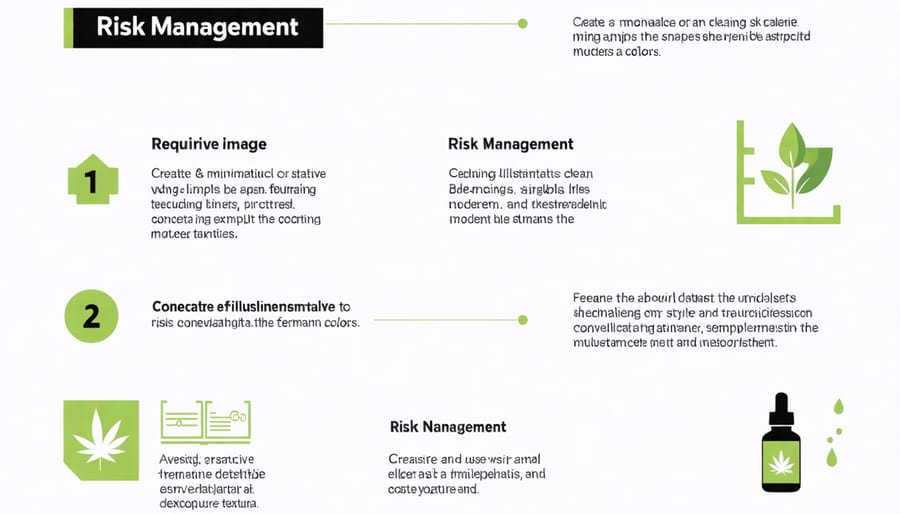Navigate the complex financial landscape of starting a CBD business with strategic planning and risk management. Secure initial capital through specialized cannabis industry investors, maintaining detailed compliance documentation for CBDNorth CBD and similar ventures. Calculate precise startup costs, including licensing fees, inventory management, and regulatory compliance expenses, typically ranging from $50,000 to $250,000 for a mid-sized operation. Implement robust financial tracking systems that separate operational costs from revenue streams while adhering to Canadian banking regulations. Structure your business model to accommodate the unique challenges of CBD merchant processing, including higher transaction fees and specialized banking relationships. Create contingency funds specifically for regulatory changes and market fluctuations, ensuring sustainable growth in this rapidly evolving industry.
Understanding CBD Oil Business Financial Requirements
Initial Investment Considerations
Starting a CBD oil business requires careful financial planning and a clear understanding of initial costs. The typical startup investment ranges from $50,000 to $150,000 CAD, depending on your business model and scale of operations. Key expenses include licensing fees (approximately $5,000), product inventory ($15,000-30,000), and equipment for storage and handling ($10,000-20,000).
Essential capital requirements also cover legal consultation fees, which typically range from $3,000 to $8,000, ensuring compliance with Canadian regulations. Marketing and branding investments usually start at $5,000, while securing a suitable retail or manufacturing space may require $20,000-40,000 in initial costs and deposits.
Working capital for the first three to six months of operation should be factored in, typically requiring $25,000-35,000 to cover operational expenses before achieving consistent revenue. Consider setting aside an additional 15-20% of your total budget as a contingency fund for unexpected costs or market fluctuations.
Before proceeding, ensure you have a detailed business plan and maintain thorough documentation of all projected expenses. This helps when approaching financial institutions or investors for funding support.

Operational Cost Analysis
Running a CBD oil business involves several ongoing operational costs that need careful planning and monitoring. Monthly expenses typically include raw material procurement, manufacturing costs, quality testing, packaging, and storage. Staff wages, utilities, and facility maintenance also form a significant portion of regular expenditures.
Insurance premiums and compliance-related costs are essential considerations, as the CBD industry requires specific coverage and regular testing requirements. Marketing and distribution expenses, including e-commerce platform fees and shipping costs, should be factored into your monthly budget.
To maintain healthy cash flow, establish a detailed tracking system for all expenses and maintain an emergency fund covering at least three months of operational costs. Consider implementing cost-saving measures such as bulk purchasing of materials, energy-efficient equipment, and automated inventory management systems.
Regular financial reviews and adjustments to your operational budget are crucial. Work with suppliers to negotiate better terms and look for opportunities to optimize processes without compromising product quality. Remember that reinvesting in quality control and customer service can lead to long-term cost savings through customer retention and reduced returns.
Securing Financing for Your CBD Operation
Traditional vs Alternative Lending Options
When exploring financing options for your CBD business, you’ll encounter both traditional and alternative lending paths. Traditional financing options typically include bank loans, business lines of credit, and commercial mortgages. These options often provide lower interest rates and longer repayment terms but require extensive documentation, strong credit history, and may take longer to process.
Alternative lending solutions have emerged as viable options for CBD entrepreneurs facing challenges with conventional financing. These include private lenders, angel investors, crowdfunding platforms, and specialized CBD industry investors. While these alternatives may have higher interest rates, they often offer more flexible terms and faster approval processes, particularly beneficial for businesses in the evolving CBD sector.
Merchant cash advances and revenue-based financing have become increasingly popular among CBD businesses. These options provide funding based on your business’s cash flow rather than traditional credit metrics, making them accessible to newer enterprises or those with limited credit history.
Consider exploring strategic partnerships with suppliers or distributors who may offer trade credit or inventory financing. Additionally, equipment financing and lease-back arrangements can help preserve working capital while securing necessary operational assets.
Remember to carefully evaluate each option’s terms, interest rates, and repayment schedules. The right financing mix often combines multiple sources to create a sustainable funding strategy aligned with your business goals and cash flow patterns.

Building Strong Banking Relationships
In the rapidly evolving CBD industry, learning to establish banking relationships is crucial for long-term success. Start by researching financial institutions that have experience working with CBD businesses and understand the unique challenges of the industry. Be transparent about your business model, compliance measures, and financial projections when approaching potential banking partners.
Maintain detailed documentation of your licensing, permits, and compliance procedures. This helps build trust with financial institutions and demonstrates your commitment to operating within regulatory frameworks. Consider working with smaller credit unions or regional banks that may be more receptive to CBD businesses than larger national institutions.
Keep separate business and personal accounts to maintain clear financial records. Regular communication with your banking representative helps address concerns promptly and keeps you informed about policy changes that might affect your business. Consider building relationships with multiple financial institutions to diversify your banking options and reduce risk.
Stay current with industry regulations and banking policies affecting CBD businesses. Join industry associations and networking groups to learn from others’ experiences and stay informed about financial institutions that support CBD enterprises. Remember that building strong banking relationships takes time and patience, but it’s essential for your business’s financial stability and growth.

Risk Management and Compliance
Insurance and Legal Protection
Operating in the CBD industry requires comprehensive insurance coverage and legal protection to safeguard your business interests. Start with a robust general liability insurance policy that specifically covers CBD-related products and operations. This basic coverage should be supplemented with product liability insurance, which is crucial given the nature of CBD products and potential risks associated with their use.
Consider obtaining business interruption insurance to protect against unexpected disruptions to your operations. Professional liability insurance is also essential, particularly if you provide advice or recommendations about CBD products to customers.
Working with an insurance broker who understands the CBD industry can help you identify coverage gaps and secure appropriate policies at competitive rates. Keep detailed documentation of all insurance policies, claims procedures, and coverage limits for quick reference.
From a legal standpoint, maintain relationships with lawyers specializing in cannabis law and CBD regulations. Regular legal consultations ensure compliance with changing regulations and help protect your business from potential litigation. Set aside funds specifically for legal services and unexpected legal challenges.
Remember to review and update your insurance policies annually as your business grows and regulations evolve. This proactive approach to risk management helps secure your financial future in the CBD industry.
Regulatory Financial Requirements
Operating in the CBD oil industry requires strict adherence to financial regulations and reporting requirements. Businesses must maintain detailed financial records and implement robust accounting systems to track all transactions, inventory, and revenue streams. Regular financial reporting to relevant authorities is mandatory, including quarterly and annual statements that detail income, expenses, and tax obligations.
Companies need to establish relationships with CBD-friendly financial institutions and payment processors who understand the industry’s unique requirements. This includes maintaining separate business bank accounts and implementing proper cash handling procedures. Documentation of all financial transactions must be thorough and readily available for audit purposes.
Compliance with anti-money laundering (AML) regulations is crucial, requiring businesses to implement Know Your Customer (KYC) protocols and suspicious activity reporting systems. Companies should also maintain adequate insurance coverage and establish clear financial policies that align with industry standards.
Working with financial professionals who specialize in the CBD industry can help ensure compliance while optimizing financial operations. Regular internal audits and compliance reviews are recommended to identify and address potential issues before they become problems. This proactive approach helps maintain good standing with regulatory bodies and supports long-term business sustainability.
Future-Proofing Your CBD Business
In today’s rapidly evolving CBD market, securing your business’s future requires careful planning and strategic foresight. Start by building business credit to ensure access to better financing options as your company grows. Diversifying your product line beyond basic CBD oil can help protect against market fluctuations and changing consumer preferences.
Invest in scalable technology and automation systems that can accommodate growth without requiring complete overhauls. Consider developing an e-commerce platform that can easily expand to new markets and integrate with various payment processors. Stay informed about emerging trends and regulatory changes by joining industry associations and attending trade shows.
Creating strategic partnerships with suppliers, distributors, and complementary businesses can provide stability and growth opportunities. Maintain healthy cash reserves to weather unexpected challenges and capitalize on opportunities quickly. Consider setting aside 10-15% of monthly revenue for future expansion and equipment upgrades.
Implement a robust financial tracking system that monitors key performance indicators and provides real-time insights into your business’s health. Regular financial audits and updates to your business plan ensure you’re prepared for industry changes. Finally, invest in ongoing employee training and development to build a skilled workforce capable of supporting your business’s long-term success.
To build a solid financial foundation for your CBD oil business, start by creating a detailed business plan that includes startup costs, operational expenses, and revenue projections. Establish separate business banking accounts and maintain meticulous financial records to track cash flow effectively. Consider working with financial advisors who understand the CBD industry’s unique challenges and regulations. Set aside an emergency fund to cover unexpected expenses and regulatory changes. Implement robust inventory management systems to optimize stock levels and prevent overinvestment. Finally, regularly review and adjust your financial strategy to accommodate market changes and growth opportunities. Remember to maintain compliance with Canadian banking regulations and build strong relationships with financial institutions that support CBD businesses. Taking these strategic steps will help ensure your CBD venture’s long-term financial success and sustainability.
